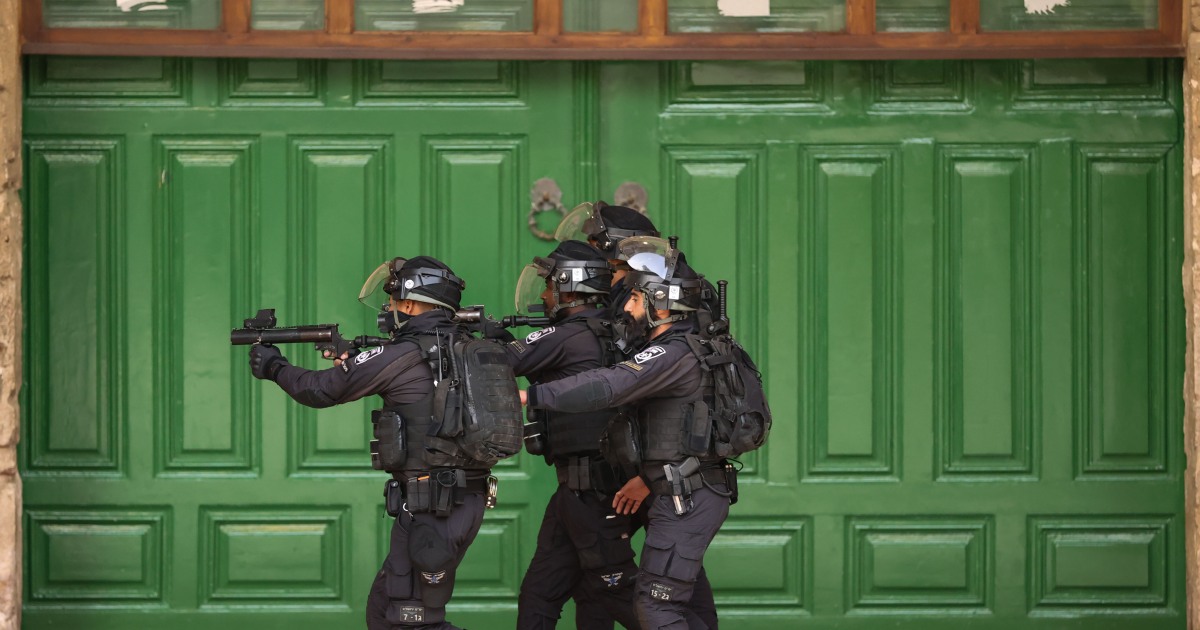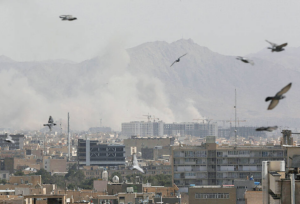
Another Ramadan, another attack on Palestinian worshipers at the Al-Aqsa Mosque compound in occupied East Jerusalem. In explaining the Israeli attacks, the majority of Euro-American politicians, media analysts, and commentators, exemplified in this predictably inane CBC report, are emphasising the “high tensions” that come along with the confluence of three major religious events, and framing Israeli actions as a response to the “Palestinian terrorist attacks” in four Israeli cities.
Palestinians are accustomed to hearing these types of explanations that basically present a distorted picture of a religious conflict that is caused by political Islamist ideologies and their bigotry, intolerance, and hatred towards Jews. The Palestinian people, who are quintessentially defending their right to exist and live on the lands that they have called home for generations across centuries, are labelled by Israel and its Euro-American allies as violent, hateful, emotional, irrational, and backwards people who continuously cause cycles of violence.
Underneath this superstructure of fanciful Israeli and Euro-American ideologies, political sophistry, and ahistorical narratives, is the brute reality of settler-colonial conquest. The reason Israel has launched this latest attack is the same reason that it has launched so many before it and will be the reason for their coming attacks: The Israeli state is built on a foundation of settler colonial sovereignty.
Embedded at the foundation of the Israeli state, continuously animating its actions and policies, regardless of which political party or coalition is in power, is the idea that Israel, as a Jewish majority nation-state, must secure and expand supreme sovereign control over the land of historic Palestine. This is the cause and the goal of Israeli violence.
It is the cause because Israeli violence springs from the project of colonial modernity and replicates it in Palestine. Zionism was originally driven by the desire to protect European Jews from the horrors of European anti-Semitism. But as soon as this desire took the path of settler colonisation and practised settler-colonial violences in Palestine beginning in the early parts of the 20th century, the cause itself became the establishment of settler colonial sovereignty, which is necessarily supreme in its logic and form. It is also the goal of Israeli violence because supreme sovereignty over the entire land of historic Palestine is yet to be definitively secured for Israel. Palestinian resistance still stands in its way.
Israeli violence
In my scholarly work, I have argued that it is irrelevant whether Israeli police, soldiers, settlers, or politicians believe that they are simply using violence to “contain a riot”, “establish law and order”, “protect Israeli civilians”, “maintain the status quo of the holy sites”, and so on.
To achieve these proclaimed intentions and motivations, it is not necessary to attack a woman from behind with a police baton as she films the desecration of the Muslim holy sites; violently push and kick elderly men as if they’re cattle; arrest children and surround one lonesome child with a dozen armed Israeli police as if he is an evil supervillain; break the stained glass windows and damage centuries-old walls in Al-Aqsa Mosque; fire tear gas, stun grenades, and rubber-coated steel bullets at worshippers inside the Mosque; prevent ambulances from reaching the approximately 158 injured; attack medical staff who were helping the injured inside the compound; assault a photojournalist who is documenting Israeli actions; arrest at least 450 Palestinians and then proceed to violently assault their relatives who went to wait for them outside of Israeli jails, and the list goes on and on.
These acts of violence are not about security, law and order, or maintaining the status quo. They are revelatory of the Israeli drive to assert supreme Israeli sovereignty over Palestine and Palestinians. The message of these acts of violence is this: Israel has the final and last judgement on the life and death of Palestinians, and there are no serious consequences for Israelis and no tangible recourse for Palestinians once those judgments are decided, sometimes at a whim.
This aspiration towards supreme power is prevalent throughout Israeli politics and society and has been for some time. It was almost a year ago that Israel launched a devastating military onslaught on the Gaza Strip in the wake of similar events that are happening today: expulsions of Palestinians from their homes and the desecration of Muslim places of worship. From May 10 to May 21, 2021, an 256 Palestinians were killed, including 66 children, and nearly 2,000 Palestinians were injured, including more than 600 children, 400 women, and 1,000 men. The infrastructural damage was severe: Some 2,000 housing units were either destroyed or severely damaged; 15,000 housing units suffered some damage; multiple water and sanitation facilities and infrastructure were damaged (leaving approximately 800,000 people without regular access to safe water), 58 education facilities, nine hospitals and nineteen primary healthcare centres all suffered some damage. There was an estimated $89m worth of damage to the energy, agricultural, and industrial sectors. Again, these acts of violence are clearly disproportionate and not necessary for the proclaimed goal of “Israeli security.” They arise out of and are meant to cement and achieve total and absolute Israeli Jewish sovereign power over the Palestinians.
This drive towards supreme sovereignty explains why all this destruction in just 11 days, piled as it is on top of the long continuum of Israeli violence, did not satisfy the majority of the Israeli public. When the ceasefire came into effect, a poll published on Israel’s Channel 12 “indicated that 72 percent of Israelis thought the air campaign in Gaza should continue, whereas 24 percent said Israel should agree to a cease-fire.” Israelis communicated a range of expressions and statements, from the indifferent to the euphoric, for their desire to continue unleashing Israel’s war machine. Many videos appeared on social media of Israeli civilians dancing and celebrating the onslaught on Gaza and the violence against Palestinians everywhere, chanting “Death to Arabs,” and “May your village burn down,” and showing a general disregard for the death and destruction of the Palestinians as a people.
When this dehumanisation of Palestinians appears in mainstream media and public discourse within Israeli and Euro-American spaces, it is framed in a normalising manner. For example, last year in a New York Times report, the desire for the majority of Israelis to continue the onslaught on Gaza is framed as Israelis simply wanting a “final conclusion” to “a very unpleasant situation”, and a “decisive victory against Hamas.”
Even when Israelis expressed genocidal wishes against the Palestinians in the Gaza Strip, when an Israeli person states, “the government should wipe out Gaza once and for all,” even in that situation, the CBC’s flagship nightly news programme, The National, found a way to cleanse and make presentable these expressions of a genocidal and eliminatory drive. In their feeble narratives, the New York Times presented Israeli quotes as frustrated Israelis who just want peace and quiet; the CBC framed the genocidal statement as scared Israelis who want security and are understandably angry. Both narratives offer nothing in the way of revealing the reality of violence, but rather themselves participate in the concealment of that reality. These orientalist, racialised, and violent narratives are part of the operation of settler-colonial violence, and as such, cannot reveal it.
That’s where we are still today in the same place we have been for decades: mainstream and dominant international discourse focuses on distractions and distorted pictures of what is happening to Palestinians, while Israel continues to unleash violence that is caused by and geared towards the goal of supreme sovereignty.
This is a form of sovereignty that has nothing to do with the complex and rich religion of Judaism and the Jewish tradition. Rather, following the logic of colonial modernity, this form of sovereignty, akin to other Euro-American (neo)colonial and settler-colonial states such as the United States, seeks to establish a kind of power that diverse cultures and religions across human history have reserved only for the gods: a kind of power that allows an entity to act with impunity because it is the first and last judge.
This latest attack on the Al-Aqsa Mosque compound has little to nothing to do with a supposed Muslim-Jewish clash and has much more to do with a form of sovereignty that attempts to secure and establish a god-like power for a particular settler-colonial nationality. So long as the Israeli project is driven by the aspiration towards supreme power and sovereignty over Palestinians and Palestine, then we will be writing about Israeli attacks on Palestinian worshippers for years to come. Nothing short of a foundational transformation in the logic and structures of colonial modernity will prevent what is, at this moment, an inevitable outcome: more death and destruction for Palestinians and Palestine.
The views expressed in this article are the author’s own and do not necessarily reflect Al Jazeera’s editorial stance.






